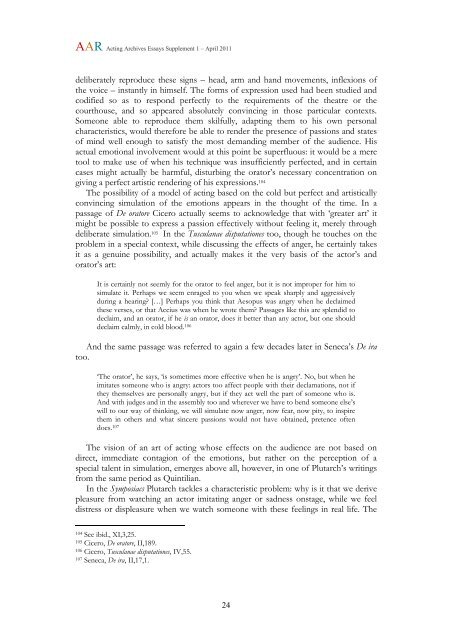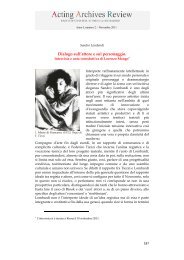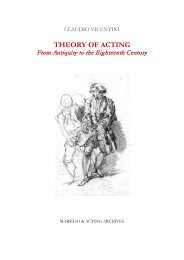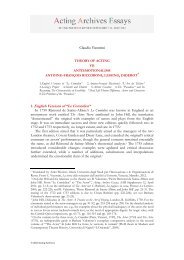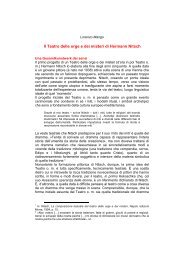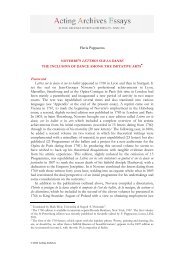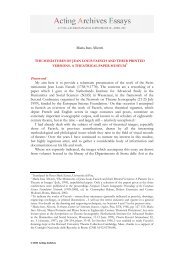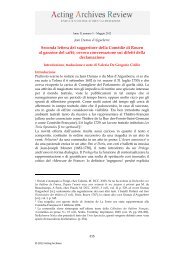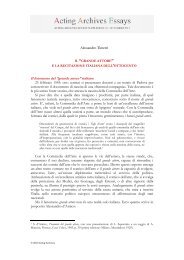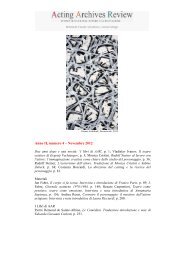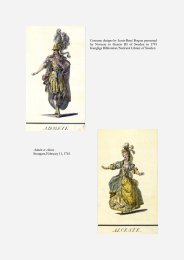Claudio Vicentini_Acting Theory in the Ancient World - Acting Archives
Claudio Vicentini_Acting Theory in the Ancient World - Acting Archives
Claudio Vicentini_Acting Theory in the Ancient World - Acting Archives
Create successful ePaper yourself
Turn your PDF publications into a flip-book with our unique Google optimized e-Paper software.
AAR <strong>Act<strong>in</strong>g</strong> <strong>Archives</strong> Essays Supplement 1 – April 2011deliberately reproduce <strong>the</strong>se signs – head, arm and hand movements, <strong>in</strong>flexions of<strong>the</strong> voice – <strong>in</strong>stantly <strong>in</strong> himself. The forms of expression used had been studied andcodified so as to respond perfectly to <strong>the</strong> requirements of <strong>the</strong> <strong>the</strong>atre or <strong>the</strong>courthouse, and so appeared absolutely conv<strong>in</strong>c<strong>in</strong>g <strong>in</strong> those particular contexts.Someone able to reproduce <strong>the</strong>m skilfully, adapt<strong>in</strong>g <strong>the</strong>m to his own personalcharacteristics, would <strong>the</strong>refore be able to render <strong>the</strong> presence of passions and statesof m<strong>in</strong>d well enough to satisfy <strong>the</strong> most demand<strong>in</strong>g member of <strong>the</strong> audience. Hisactual emotional <strong>in</strong>volvement would at this po<strong>in</strong>t be superfluous: it would be a meretool to make use of when his technique was <strong>in</strong>sufficiently perfected, and <strong>in</strong> certa<strong>in</strong>cases might actually be harmful, disturb<strong>in</strong>g <strong>the</strong> orator’s necessary concentration ongiv<strong>in</strong>g a perfect artistic render<strong>in</strong>g of his expressions. 104The possibility of a model of act<strong>in</strong>g based on <strong>the</strong> cold but perfect and artisticallyconv<strong>in</strong>c<strong>in</strong>g simulation of <strong>the</strong> emotions appears <strong>in</strong> <strong>the</strong> thought of <strong>the</strong> time. In apassage of De oratore Cicero actually seems to acknowledge that with ‘greater art’ itmight be possible to express a passion effectively without feel<strong>in</strong>g it, merely throughdeliberate simulation. 105 In <strong>the</strong> Tusculanae disputationes too, though he touches on <strong>the</strong>problem <strong>in</strong> a special context, while discuss<strong>in</strong>g <strong>the</strong> effects of anger, he certa<strong>in</strong>ly takesit as a genu<strong>in</strong>e possibility, and actually makes it <strong>the</strong> very basis of <strong>the</strong> actor’s andorator’s art:It is certa<strong>in</strong>ly not seemly for <strong>the</strong> orator to feel anger, but it is not improper for him tosimulate it. Perhaps we seem enraged to you when we speak sharply and aggressivelydur<strong>in</strong>g a hear<strong>in</strong>g? […] Perhaps you th<strong>in</strong>k that Aesopus was angry when he declaimed<strong>the</strong>se verses, or that Accius was when he wrote <strong>the</strong>m? Passages like this are splendid todeclaim, and an orator, if he is an orator, does it better than any actor, but one shoulddeclaim calmly, <strong>in</strong> cold blood. 106And <strong>the</strong> same passage was referred to aga<strong>in</strong> a few decades later <strong>in</strong> Seneca’s De iratoo.‘The orator’, he says, ‘is sometimes more effective when he is angry’. No, but when heimitates someone who is angry: actors too affect people with <strong>the</strong>ir declamations, not if<strong>the</strong>y <strong>the</strong>mselves are personally angry, but if <strong>the</strong>y act well <strong>the</strong> part of someone who is.And with judges and <strong>in</strong> <strong>the</strong> assembly too and wherever we have to bend someone else’swill to our way of th<strong>in</strong>k<strong>in</strong>g, we will simulate now anger, now fear, now pity, to <strong>in</strong>spire<strong>the</strong>m <strong>in</strong> o<strong>the</strong>rs and what s<strong>in</strong>cere passions would not have obta<strong>in</strong>ed, pretence oftendoes. 107The vision of an art of act<strong>in</strong>g whose effects on <strong>the</strong> audience are not based ondirect, immediate contagion of <strong>the</strong> emotions, but ra<strong>the</strong>r on <strong>the</strong> perception of aspecial talent <strong>in</strong> simulation, emerges above all, however, <strong>in</strong> one of Plutarch’s writ<strong>in</strong>gsfrom <strong>the</strong> same period as Qu<strong>in</strong>tilian.In <strong>the</strong> Symposiacs Plutarch tackles a characteristic problem: why is it that we derivepleasure from watch<strong>in</strong>g an actor imitat<strong>in</strong>g anger or sadness onstage, while we feeldistress or displeasure when we watch someone with <strong>the</strong>se feel<strong>in</strong>gs <strong>in</strong> real life. The104 See ibid., XI,3,25.105 Cicero, De oratore, II,189.106 Cicero, Tusculanae disputationes, IV,55.107 Seneca, De ira, II,17,1.24


